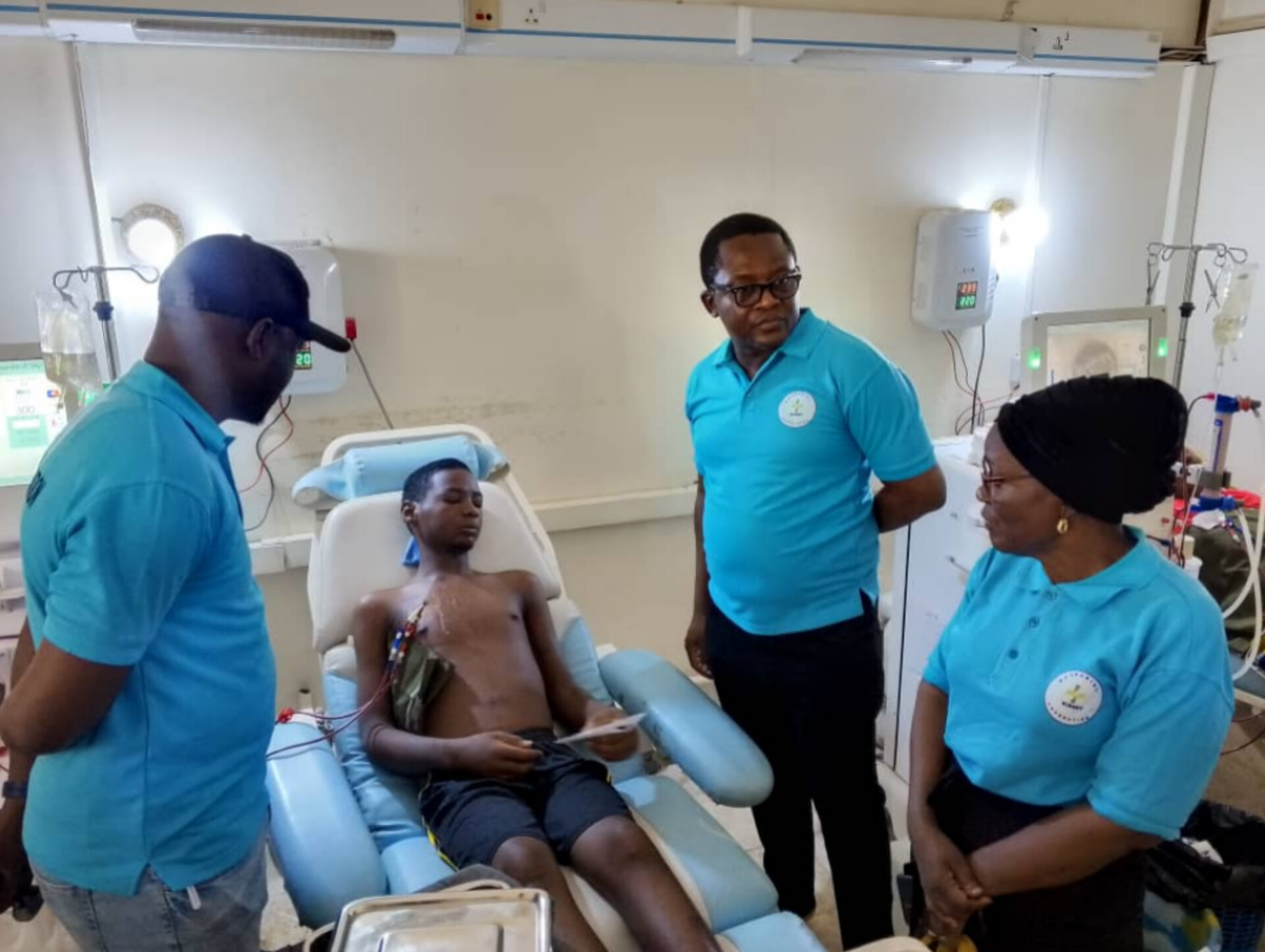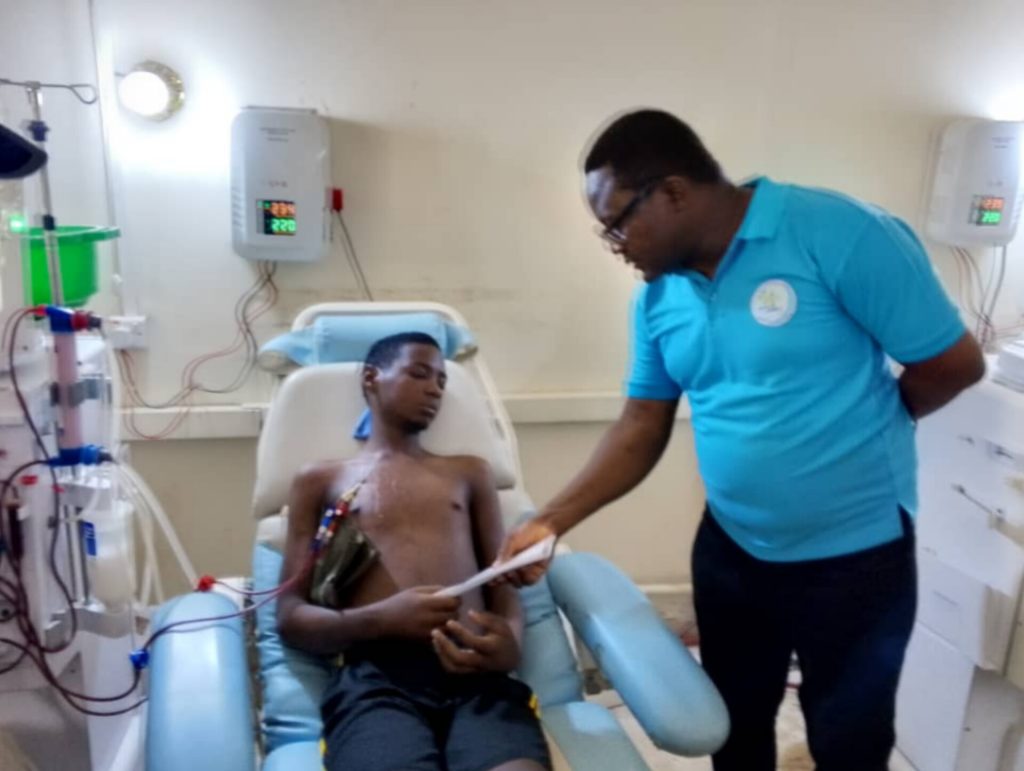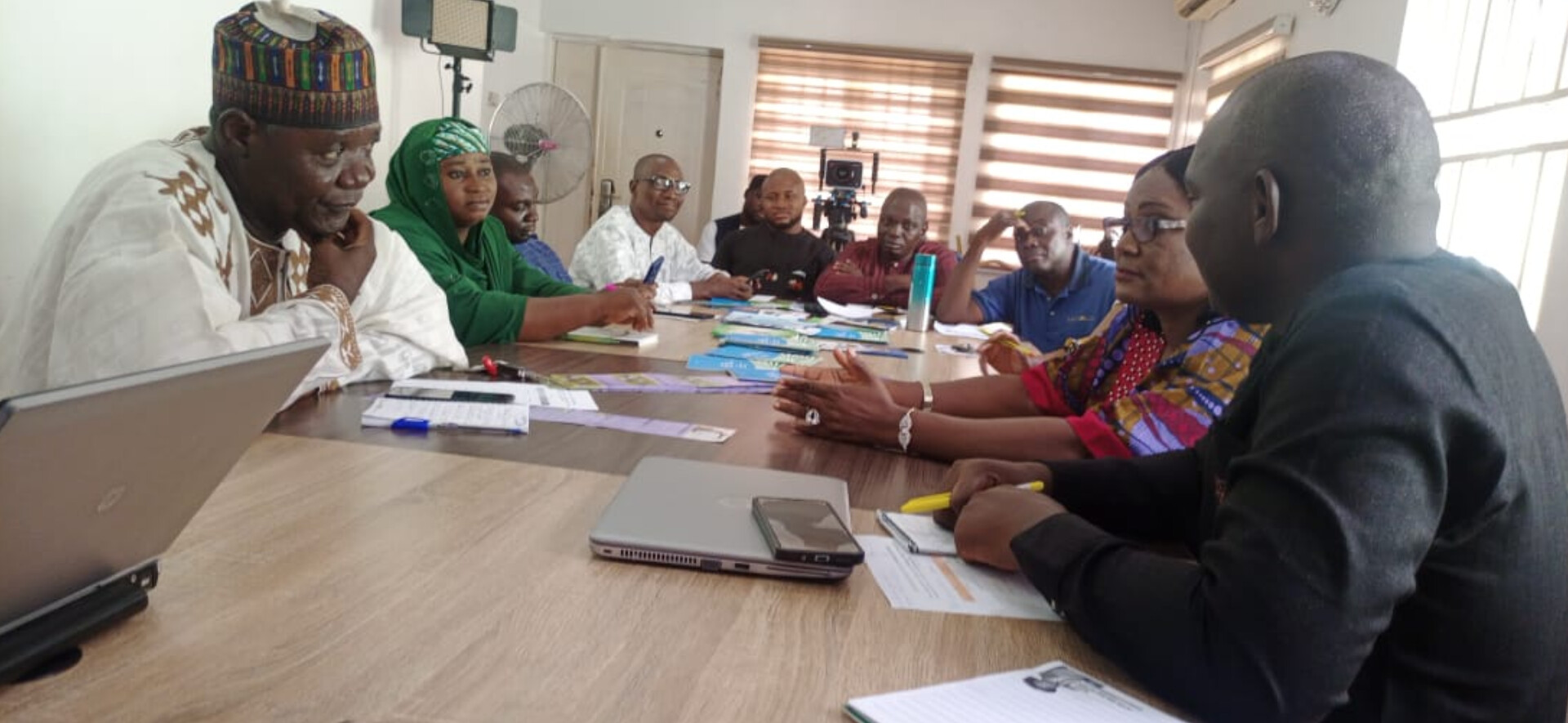Health
Iwu should have made some herbal therapy for politicians, Adebayo taunts failed leaders

Apparently piqued by the abysmal performance of Nigerian politicians that has kept the country underdeveloped, the Presidential aspirant under Coalition of Opposition Parties, (COP) Prince Adewole Adebayo, has taunted failed leaders by asking Professor Maurice Iwu that of all his reforms at INEC he forgot to formulate herbal therapy for politicians.
Professor Maurice Iwu is a Nigerian Professor of Pharmacognosy who was appointed Chairman of the 2r (INEC) in June 2005, and completed his tenure in April 2010.
Prince Adebayo, who chaired the occasion of the public presentation of a book, ‘Healing Plants of Nigeria, ethnomedicine and therapeutic applications, written by Rev. Fr. Dr Anselm Adodo and Professor Maurice Iwu, in Abuja said, Nigeria is facing leadership crises because the politicians need some herbal remedy.
According to him
Trado-medicine if properly harnessed can generate $100b revenue and create 3m jobs.
He therefore called on Nigerians to invest in traditional medicine, describing it as a major revenue boost if properly developed
He lamented that the country has over the years expended huge resources on spiritual matters but failed to invest in development of ethnomedicine sector for good of the people,
He said Nigeria can generate over $100 billion from plant medicine industry if it pays serious attention to it.
Adebayo regretted that the herbal medicine sector was suffering from the same years of neglect and lack of focus to develop various sectors in the country.
He said, “What has happened to our traditional medical field is what has happened to almost every aspect.
“It is the same reason why we don’t have electricity, it is the same reason why lecturers are on strike, it is the same reason why we are importing fuel that we should be producing.”
The presidential hopeful vowed to do the opposite of what the government is doing instead of adding to the lamentations of why our government has failed.
According to him, “Nigerians know already, so, they want me to bring solutions. The solution is that we are going to do opposite of what the government has been doing.
“We are going to encourage industrialization, science, technology, research and development. We are going to encourage local production of goods.”
“My view of traditional medicine is that it is the main medicine. I have been an investor in the sector for many years. You can see many of the Professors here; we have done research together, Professor Maurice iwu, Professor Kunle and many of the Professors.
“We have done research together with other Professor. It is something I have done over the years, and these products, we have commercialize many of them.
“So, my attitude to traditional medicine is the same attitude I have to other natural resources that Nigeria has, that we must value what is ours and we must promote what is ours and we must educate our people about what we have.
“And they are my aspect that is sound skeptical like these gentlemen have tried to deal with the area of ethnomedicine. But the idea is that, if we want to be self sufficient, as a country, we must be able to feed our people and heal your people when they are ill.
“When they are healthy, you will make sure that they remain healthy and that you generate resources. It will surprise you that we have more money in plants medicine than we have in Nigerian National Petroleum Corporation, NNPC.
“So, if Nigeria were to pay attention to plants medicine and to do the kind of investment which I have made in this sector over the years, we can generate an industry of over a $100 billion. And our budget this year is less than N40 billion.
“That is why I have confidence in the county. I have no worry about Nigeria at all because I know where the resources are, I know where the opportunities are. We can generate up to three million jobs just from the propagation of plants, from development of plants, from the methodology used from training laboratories.
“If Nigeria wants to do industrial revolution, it is not by importation from foreign industries, it is by understanding ethnomedicine and ethnomethodology for developing our own product.
“And I believe that when we are in government, this will be a new brain. We have all the people we need. I know all the people in the scientific industry, the researchers, and the institutions. So I don’t have any concern that we will do well in this sector.
“So, herbal medicine to me is not what we see in the movies or if you have a headache you go to herbalist. It is a whole industry and in accessing that industry is the commercialization of plants for exports. Because we have plants for some diseases that are not common to us, there are western diseases that plants can also work for them.
“So, it generates income for you and it is also the raw materials you use for other products but are not medicine or medicinal but are used for other production industry, so, it is a field that I am very familiar with and will promote it when in government.
“What has happened to our traditional medical field is what has happened to almost every aspect.
“It is the same reason why we don’t have electricity, it is the same reason why lecturers are on strike, it is the same reason why we are importing fuel that we should be producing.
“So, we don’t have good government and it should not be forever. So, we need to take care of them now. I am more focused on finding solution and I have found solutions to most of these problems.
“So, in my public speaking, in my campaign, I am focusing on what I will do. Because adding to the lamentations of why our government has failed, is not tenable. Nigerians know already, so, they want me to bring solutions.
“The solution is that we are going to do opposite of what the government ha being doing. We are going to encourage industrialization, science, technology, research and development.
“We are going to encourage local production of goods; we are going to encourage education along the line of practical and pragmatic application of knowledge.”
Health
SCI, GSK Launch $1m Initiative to boost Immunization rate in Nigeria

By Ahmed Rufa’i Dutse
Ahead of World Immunization Week, The Save the Children International (SCI) and GlaxoSmithKline (GSK) have launched $1 million initiative to empower local organisations in Nigeria and Ethiopia.
This they observed is aimed at fast-tracking cutting-edge solutions to tackle long standing barriers which prevent children from receiving vaccinations.
This was contained in a press statement made available to our reporter in Dutse by the acting Media and Communications Manager of the Save the Children International, in Nigeria, Rhoda Ndahi
According to her, Save the Children and GSK Immunisation Accelerator is opened for applications from community-based organisations, national NGOs, local research teams, social enterprises and tech companies.
According to the statement “The Africa continent has the highest number of ‘zero dose’ children, those who have never received a routine vaccination – in the world: 8.7 million children and more than a third of these children live in Nigeria and Ethiopia, where the combined impacts of the pandemic, poverty, climate change, instability and conflict are disrupting vaccination campaigns”.
The Media and communication manager explained that the most promising approaches will get the opportunity to increase their impact through financial and technical support and pilot their innovations in a live setting”.
Ndahi disclosed further that last year Save the Children and GSK renewed their decade long partnership for a further five years, with an investment of £15 million from GSK enabling two new vaccination programmes in Ethiopia and Nigeria focused on reducing the number of zero dose children.
“Building on this work, innovators applying to the Accelerator can address any type of barrier to access and utilisation of vaccines on both the supply and demand side, such as improving community engagement, streamlining logistics to increase the availability and accessibility of vaccines and strengthening data management to track vaccine coverage rates”.
Grants on offer are up to the value of $100,000 per project, alongside wrap-around support services from technical guidance to legal advice and branding assistance, tailored towards addressing the diverse needs of varying size, companies and startups.
In the statement the Country Director of Save the Children International Nigeria, Duncan Harvey, stated “Save the Children has been deeply committed to implementing immunization-related projects and interventions across Nigeria in response to the high rate of zero-dose and unimmunized children in the country.
The country director added that the Save the Children and GSK Immunisation Accelerator was born out of an understanding of the urgent necessity for locally led innovation to achieve our shared vision of a world where no child suffers from a vaccine-preventable disease.
“This collaboration opens new opportunities and efforts in tackling the barriers and defiance to immunization, especially in our communities.
As locally led innovators, the uniqueness and relatability of the innovations will address widely the issues of zero-dose immunized children and provide more sustainable solutions that translate to a higher number of children being immunized.”
The GSK chief global health officer, Dr Thomas Breuer said: “We’re excited to see applications opened for the Immunisation Accelerator.
“Our partnership with Save the Children is guided by local communities, experts and stakeholders, so seeking out the local knowledge and capabilities in Ethiopia and Nigeria is fundamental in finding unique innovations that could help address the critical need for improvements to vaccination rates amongst children.
Dr. Thomas Breuer maintained that “We eagerly anticipate the fresh ideas that the Accelerator will bring, and we’re ready at GSK to support these innovations come to fruition, to help change the trajectory for children in Nigeria, Ethiopia and beyond.”
GSK chief global health officer noted that “To be considered, projects must be at the testing stage of the innovation cycle and show evidence of how they could address a priority immunisation barrier. Each will be reviewed against a robust selection criteria and consistently evaluated”,
Health
World kidney Day: Foundation off-sets medical bills of kidney patients in Niger

As part of the activities to mark this year’s world kidney day, Nathaniel Kidney Foundation (NKF) in Niger State has off-set the medical bills of a number of kidney patients at the Ibrahim Badamosi Babangida (IBB)) Specialist Hospital in Minna, the Niger State capital.
The kidney foundation which was established in 2022 by the family of late Nathaniel Matthew, a 24 year old kidney patient who lost the battle to the disease in 2021 has since its establishment reached out to over 50 kidney patients across the state in the area of offsetting their medical bills.
In addition to settling the medical bills of kidney patients, the foundation has used every world kidney day to embark on an enlightenment campaign and sensitization on radio and television against the kidney disease on the causes and possible prevention of the disease.
The Chairman of the foundation, Mr. Gideon Makeri while speaking to newsmen in Minna, shortly after a sensitization walk and a visit to the patients at the IBB Specialist Hospital in Minna, said the foundation was established by the parents of late Nathaniel Matthew to remember the promising young man whose life was cut short due to kidney infection.
This year’s world kidney day which he said coincided with the birthday of the late Nathaniel, was used to reach out to the kidney patients through off-setting their medical bills, stressing that the foundation since inception two years ago, has supported kidney patients in the area of treatment both home and abroad.
According to him, “over 50 kidney patients have so far benefitted from the foundation. The beneficiaries include those that the foundation has supported in the area of treatment at home and abroad and they are today healed of the diseases and are doing well”.
He disclosed that among the beneficiaries this year was a 300 level student of the Ibrahim Babangida University (IBBU) Lapai who is currently placed on dialyses at the hospital, adding that seven kidney patients have their hospital bills settled as part of the activities to mark this year’s world kidney in the state.
While appealing to individuals and organizations to partner with the foundation towards assisting kidney patients in the state, Mr. Makeri decried the rising cost of treatment for kidney disease in the country, adding that to undergo dialyses now, a patient need N30,000 and such patients might be required to undergo the session three times in a week.
“In advanced countries, the government pays for dialyses for the people but in Nigeria the reverse is the case, and because of this, some people stayed back at home and resigned their faith to God. That is why we are appealing to individuals and organizations to come and partner with the foundation to save lives”.
The Chief Medical Director of IBB Specialist Hospital, Dr. Bala Waziri commended the family of the late Nathaniel for sustaining the foundation since it was launched two years ago, saying that the foundation has made a remarkable contributions to lives of kidney patients in the state, and urged them sustain the momentum.
According to him, a lot of people living with the disease in the state and the country in general are going through very difficult times, especially with high cost of the treatment of the disease, pointing out that “the price of drugs and dialyses equipment have gone up beyond the reach of ordinary Nigerian. A lot of patients no longer afford the cost of the treatment.
“Some patients undergo dialyses three times in a week with each costing N30,000. This is aside the normal kidney drugs which the price has equally gone up for more than 100 percent”.
He described the condition of kidney patients in the hospital as very pathetic and therefore appealed to individuals and organizations to come to the aids of those suffering from the disease.
Health
Media professionals move to curb apathy towards HVP vaccination

From Daniel Abel Lafia
Media professionals under the auspices of Sustainable Media Advocacy Foundation (SMAF), on Wednesday promised to intensify media campaigns against the negative public perception of Vaccination against Human Papilloma Virus among young girls between the ages of 9 and 14 years in the state through intensive campaigns.
The foundation Chairman, Mr. Kalu Idika made this known at its advocacy meeting organized to review its activities in Lafia.
According to the SMAF Chairman, the objective of the organization is to promote media engagement for sustainable development.
“We are available to partner with any group to create every necessary awareness for people at the grassroots level.
“We are registered professionals ready to partner with any interested organization to sensitize, promote, and reach out to the nooks and crannies of the state in any field of endeavor.
The chairman, however, recalled that the foundation had undergone several trainings and have also engaged in sensitization in the area of safe sex among adolescence, maternal mortality in partnership with local and international Non Governmental Organizations, (NGOs).
Mr. Kalu noted that the foundation is currently partnering with the National Primary Health Development Agency, (NAPHDA), to ensure girls between ages 6-14 receive vaccination against the Human Papilloma Virus, HPV launched by Governor Abdullahi Sule.
Kalu, however, stated that the Foundation has undertaken many activities in the past as well adding that they enjoyed technical support from International organizations and Nasarawa State Primary Healthcare Development Agency (NAPHDA),
Mr. Ishaya Amegwa, who represented the state’s health educator, commended the foundation in ensuring adequate awareness against the myth and misconceptions about the vaccine.
With the help of the media engagement, more people are coming out even as parents are bringing their girls within the age bracket to receive the vaccine.
‘The media came to our assistance and created the necessary awareness that we needed at that time to encourage the young girls to avail themselves for the vaccination.
In a remark, the Research Monitoring and Evaluation Technical Support Lead of The Challenge Initiative, Taco, Oluwafemi Timothy Rotimi, commended SMAF for the collaboration commencement and implementation of its programme in the state.
Rotimi also noted that the Foundation had reached out to various communities and the public through its media platforms in order to communicate the positive outcome impacted on the wellbeing of the people of the state.
-

 Crime6 months ago
Crime6 months agoPolice nabs Killer of Varsity Lecturer in Niger
-

 News3 months ago
News3 months agoFCT-IRS tells socialite Aisha Achimugu not to forget to file her annual returns
-

 Appointment7 months ago
Appointment7 months agoTinubu names El-Rufai, Tope Fasua, others in New appointments
-

 News From Kogi6 months ago
News From Kogi6 months agoINEC cancells election in 67 polling units in Ogori-Magongo in Kogi
-

 News7 months ago
News7 months agoIPOB: Simon Ekpa gives reason for seperatists clamour for Biafra
-

 News From Kogi8 months ago
News From Kogi8 months agoEchocho Challenges Tribunal Judgment ordering rerun in 94 polling units
-

 Metro1 month ago
Metro1 month ago‘Listing Simon Ekpa among wanted persons by Nigeria military is rascality, intimidation’
-

 News3 months ago
News3 months agoKingmakers of Igu/ Koton-Karfe dare Bello, urge him to reverse deposition of Ohimege-Igu

